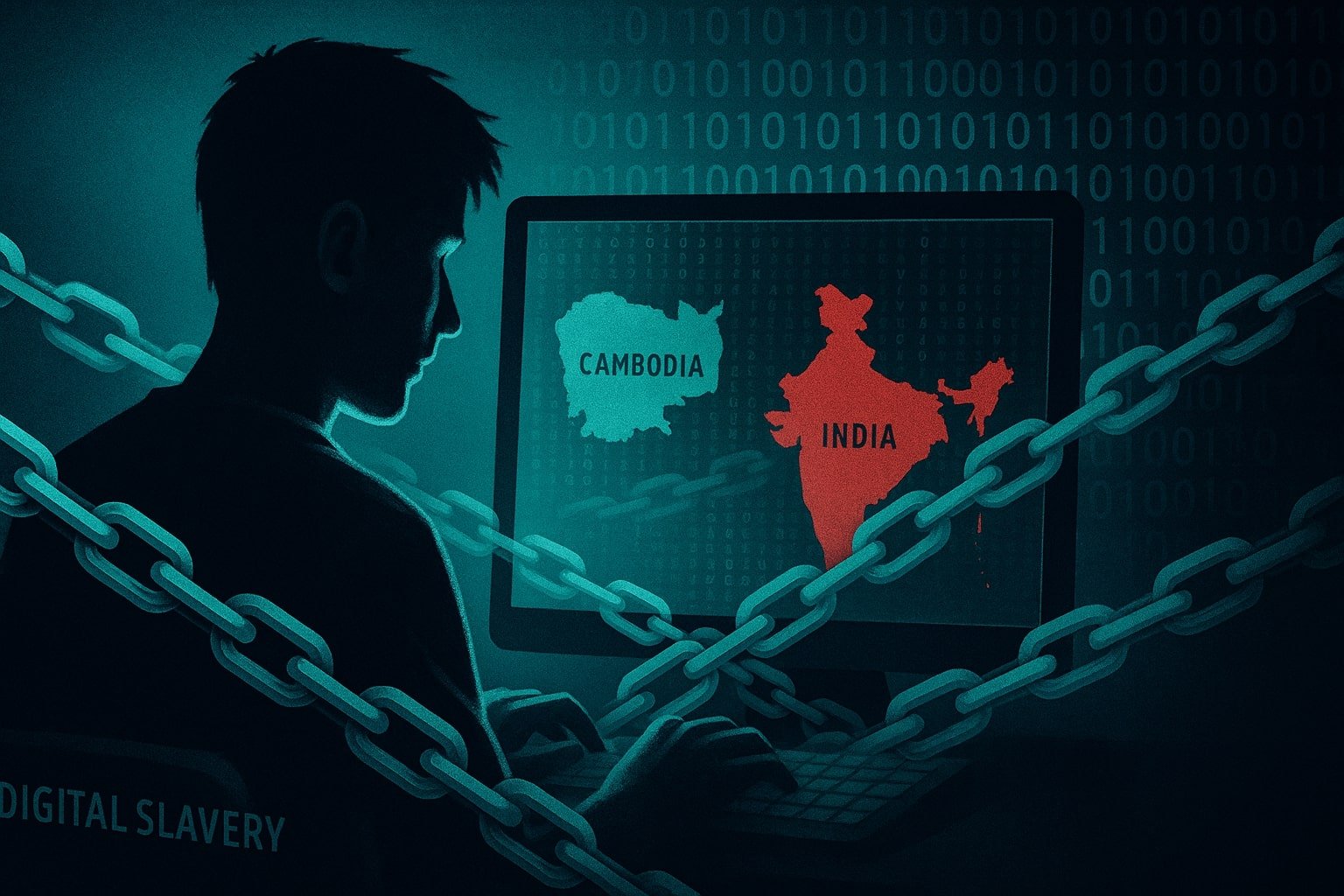Bhopal, October 27, 2025 — A sprawling international cybercrime network has come under the scanner as investigations reveal that most cyber fraud calls targeting Indian citizens are originating from Cambodia, while the stolen money is funneled through Indian bank accounts before being moved overseas.
Experts warn that unemployed Indian youth are being lured abroad with fake job offers and forced into what’s now being termed “cyber slavery.”
A Global Web of Cyber Mafias Operating from Cambodia and Beyond
According to intelligence inputs, cybercriminals based in Cambodia, Dubai, and Thailand are orchestrating large-scale online frauds against Indians. These groups rely on Indian bank accounts to disguise their operations and evade detection by local authorities.
Investigations by Indian police and cyber cells often hit a dead end once the money enters domestic accounts. From there, funds are routed through six to seven intermediary layers, eventually converted into cryptocurrency via crypto trading platforms and transferred abroad.
“This is not just cyber fraud—it’s an organized digital industry,” said a senior cybercrime investigator.
“Foreign masterminds lure Indian youth with lucrative jobs, seize their passports, and force them to operate scam call centers. It’s modern-day digital slavery.”
Cases Exposing India’s Deep Cybercrime Link to Cambodia
Recent incidents in Madhya Pradesh, Delhi, and Haryana have revealed a recurring pattern — cyber scams being coordinated from Cambodia and neighboring countries.
The First Firm to Assess Your DFIR Capability Maturity and Provide DFIR as a Service (DFIRaaS)
In Gwalior, the secretary of Ramakrishna Mission School, Supradiptanand, lost ₹2.52 crore in a “digital arrest” scam traced to Cambodia.
Asha Bhatnagar, a schoolteacher from Gwalior, was duped of ₹51 lakh through calls from Cambodia and Dubai. The stolen funds were routed to Dubai via cryptocurrency.
In Delhi, 78-year-old Naresh Malhotra from Gulmohar Park was held under a “digital arrest” for a month and defrauded of ₹22.92 crore. The calls, traced to Cambodia, used AI-generated video backgrounds mimicking police stations and courtrooms.
Crypto: The Invisible Highway of Cross-Border Money Movement
Cybercrime units have uncovered that stolen money first lands in local Indian accounts, moves through multiple mule layers, and is then converted into cryptocurrencies like Bitcoin or USDT. These assets are transferred to foreign wallets, making financial tracing nearly impossible.
According to Madhya Pradesh Cyber Police, between May 2021 and July 2025, cyber fraud cases across the state recorded a total loss exceeding ₹1,000 crore, while recovery was limited to just ₹1.94 crore — highlighting the scale and sophistication of the network.
‘Cyber Slavery’: The Dark Trade of Digital Labor
Experts describe cyber slavery as a rapidly expanding underground economy in Southeast Asia, where traffickers target unemployed youth from India, Nepal, and Bangladesh. Victims are promised high-paying jobs abroad but, upon arrival in Cambodia or Thailand, their passports are seized and they are forced to work in fraud call centers that target Indian citizens.
These scam centers specialize in manipulating victims through “digital arrest” hoaxes, fake narcotics cases, and bank fraud threats, coercing them to transfer large sums of money out of fear.
Indian Investigations Hampered by Global Barriers
Law enforcement agencies in India face severe limitations in tracking these transnational crimes. Their investigations largely end at identifying Indian bank accounts and mobile numbers, while the foreign masterminds remain beyond reach due to technical, legal, and diplomatic obstacles.
Officials admit that without robust Interpol coordination and enhanced crypto transaction tracing, dismantling such global cybercrime syndicates will remain an uphill battle.
Policy Imperatives: Strengthening Cyber Diplomacy
Cybersecurity experts are calling for the creation of a centralized cyber emergency response system that brings together banks, fintech platforms, telecom operators, and intelligence agencies.
They also emphasize the urgent need for bilateral cyber diplomacy agreements with Cambodia, Thailand, and the UAE to enable information-sharing and extradition of cybercrime suspects.
Conclusion: The New Geography of Digital Crime
The Cambodia connection has exposed a chilling truth — cybercrime has become a borderless, organized digital industry. While Indian citizens are being preyed upon, many of India’s own youth are being coerced into becoming part of this machinery.
Unless India acts swiftly by enhancing technological surveillance, global cooperation, and rapid-response frameworks, the rise of cyber slavery could soon mark one of the country’s most devastating digital crises — a grim fusion of technology, exploitation, and transnational crime.



